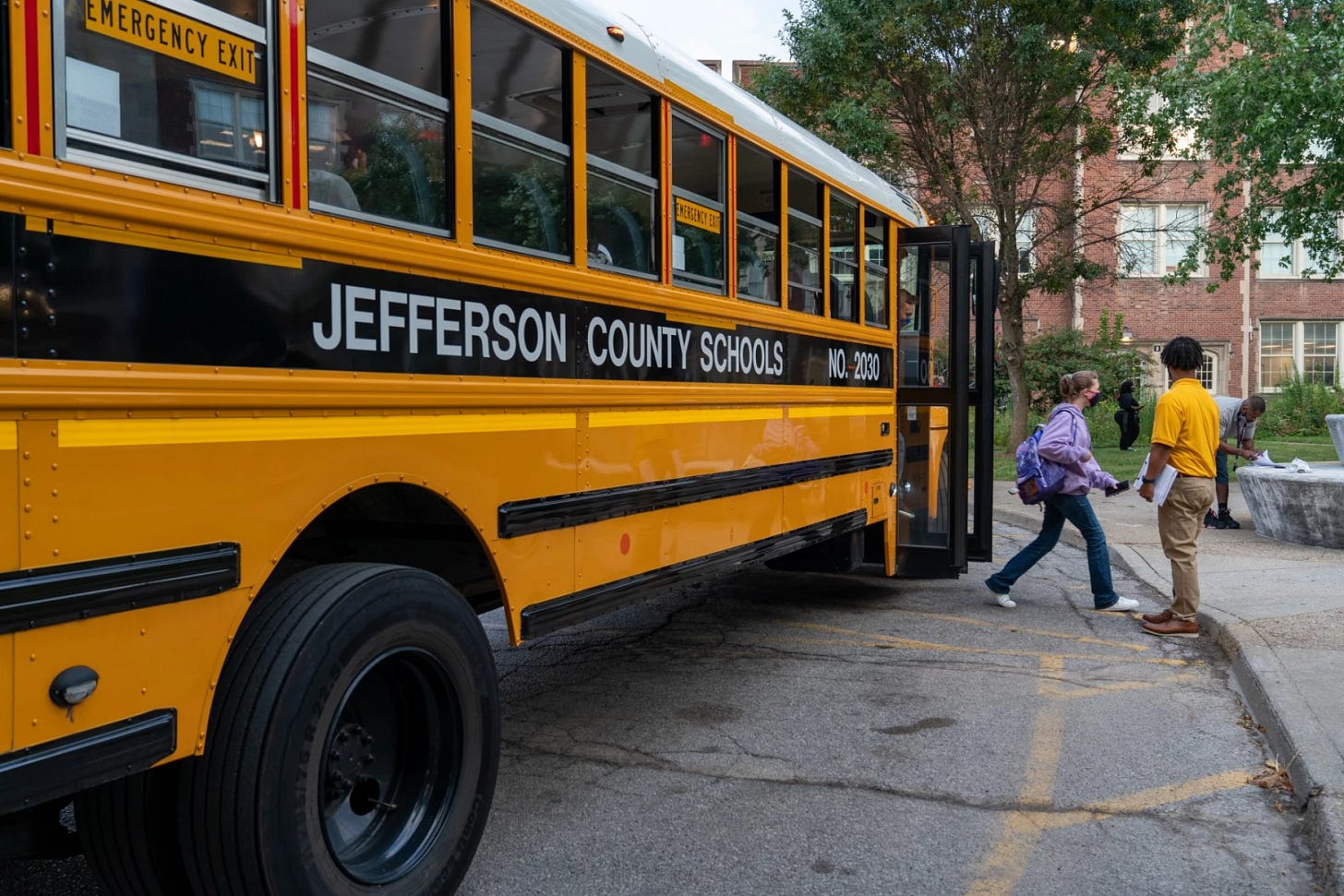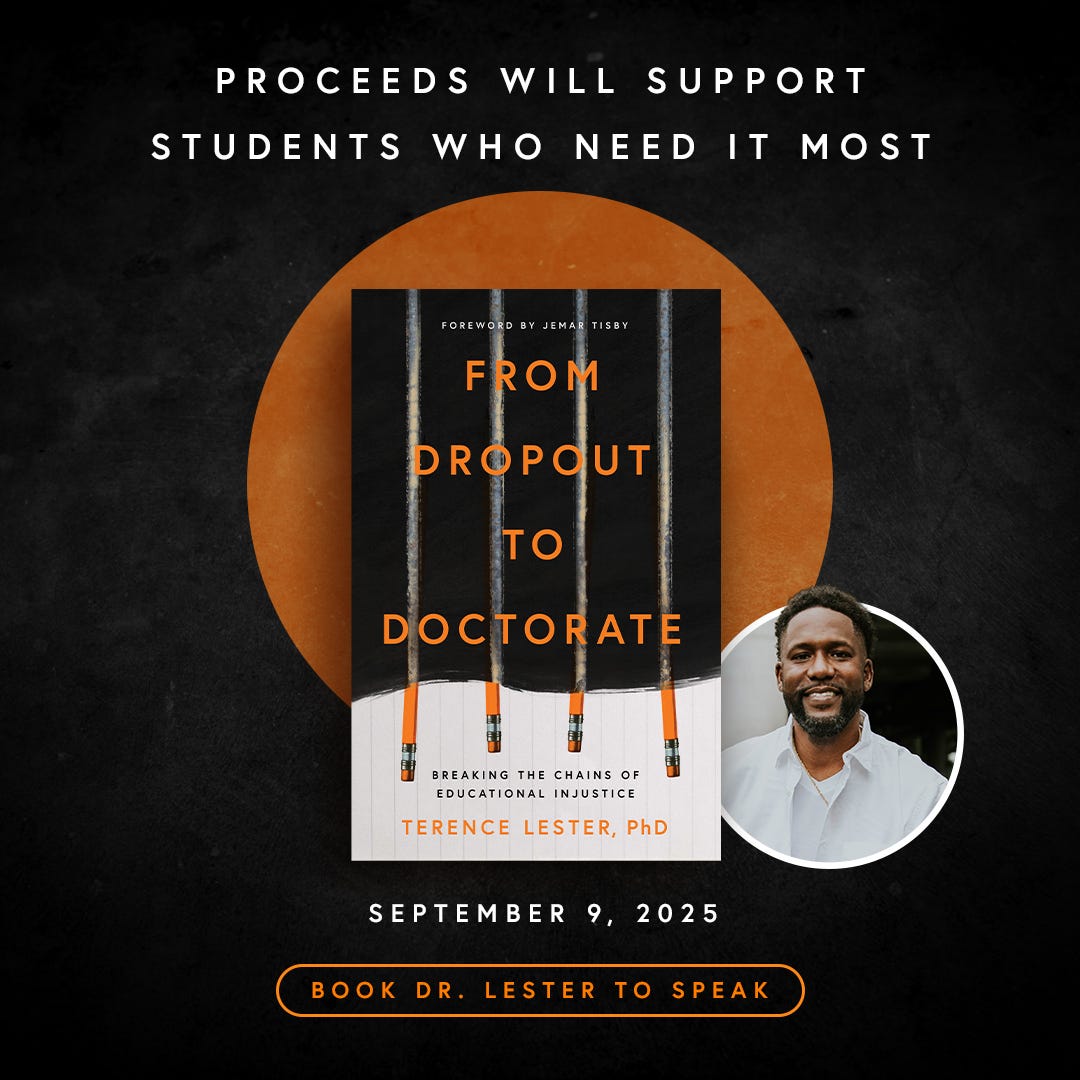A few months ago, I was doing work in Kentucky and stood in a room with graduating seniors from Jefferson County Public Schools (JCPS) in Louisville. Every single one of them was unhoused.
Some were on their own, but many were living with their families—staying in motels, shelters, living out of cars, or wherever they could find a safe space. And still, these 40-plus students showed up. They kept passing classes and fought every day to walk across that graduation stage this past May. And many of them did.

I was grateful to partner with a school social worker whose role was to make sure that unhoused students in the district didn’t fall through the cracks. She was doing everything she could to connect them to resources—things that often get missed because of the instability they’re living through.
What I learned from her—and from listening closely—is that students carry stories we rarely see from the outside looking in. Stories that don’t always show up in grades or attendance.
Some of these students weren’t just facing hardship—they were navigating real barriers. Students who didn’t know what FAFSA was. Students who had never been inside a college fair. Students trying to finish homework while wondering if they’d have dinner, or if their family would be forced to move again.
But she said something I’ll never forget:
“They’re brilliant. They’re passing all their classes. They just need someone to believe in them.”
So we showed up.
I helped pull together a college fair–style conference for those students. I wanted to make sure a local HBCU was in the room—not to talk down to them, but to meet them where they were. To listen. To create a moment that said: this is for you—college, trade school, or whatever path you choose isn’t out of reach.
It was about building a space where they could see that continuing their education beyond high school was possible—even in the face of everything they were carrying.1 That day mattered. For many of those students, it was the first time college felt like a real option. That kind of exposure can be life-changing. Why?
Because when you’re growing up in poverty or already experiencing homelessness while coming from a community that’s historically marginalized, just one thing—an eviction, a delay in aid, a missed opportunity—can shut the door completely. It can be the moment that causes you to give up altogether.
I guess I’m thinking about those students today because of what’s happening right now in the educational space—socially and politically.
Did you know:
14% of U.S. college students experienced homelessness in the past year, while 48% faced housing insecurity—that’s nearly 3 in 5 fighting just to have a place to sleep.2
Students without stable housing are 8–12 percentage points less likely to persist and graduate—especially at community colleges.3
A 2023 nationwide survey found 59% of students dealt with food or housing insecurity, and 14% reported actual homelessness.4
These are not just statistics. They’re stories. They’re students. But support can change everything.
For some students, it’s a ride to school. A mentor who checks in. A volunteer who shows up with supplies. A teacher who refuses to give up on them. That kind of support can be the thing that helps them cross the finish line.
I’ve been writing a lot lately about education—not just because I care about schools, but because I was that student. I faced all kinds of challenges. I didn’t have much morale left to finish school—especially after dropping out and trying to go back as a fifth-year senior. College felt like some far-off thing other people got to do. But it was a community of support that pushed me forward.
And I’ve kept writing because of the growing disparity, the deepening lack, and the rise in homelessness that so many families are facing right now. There are more families than we can count whose children are struggling in school—not because they don’t want to learn, but because of everything they’re carrying outside the classroom.
If you’re a K–12 educator working with vulnerable student populations—thank you.
If you’re a college professor guiding students who carry heavy stories—thank you.
If you’re an administrator pushing for better systems, access, and support—thank you.
Because without people like you, many students won’t make it.
I wrote this because their stories matter. And because students like the ones I met in Louisville, Atlanta, Chicago, Detroit, and many other cites deserve more than just a diploma—they deserve a real chance to move forward.
And, that is why I’m dedicating part of my continued dream to building up the next generation of leaders.
Read a free chapter today of the book today.
Today, I’m 50 days away from the book’s releasing From Dropout to Doctorate: Breaking the Chains of Educational Injustice. My hope is that this book inspires a student, encourages an educator, and gives some future leader the strength to keep going.
Read a free chapter now from my publisher, InterVarsity Press → [HERE]
If you’re looking for a way to get involved:
Donate to Zion’s Closet by visiting our wish list. Every item goes straight to students and helps us serve hundreds of children in a single school.
Volunteer by signing up to serve with Love Beyond Walls if you are in Atlanta for July 25th.
Sign up to be one of the 100 early readers of the book, From Dropout to Doctorate—only 8 spots remain to receive a first copy and help spread the word.
Preorder the book and share it with someone who cares about students.
And if nothing else—send prayers and positivity as we continue to do this work.
Book Dr. Lester to Speak [HERE]
Listen to the Imgaine Dignity Podcast [HERE]
Explore my co-authored children’s book, Zion Learns to See: Opening Our Eyes to Homelessness—a story that helps children understand the power of service, empathy, and making a difference in the lives of those experiencing homelessness.
If you want to explore homelessness in the U.S., please consider reading “I See You: How Love Opens Our Eyes to Invisible People.”
Explore my book “When We Stand: The Power of Seeking Justice Together” to learn about the impact of community involvement and collective action on social change.
Discover “All God’s Children: How Confronting Buried History Can Build Racial Solidarity to gain insight into the significance of understanding the historical narratives that shape people and how you might stand in solidarity with your neighbor.
Or, subscribe to the Love Beyond Walls Newsletter—by visiting the site and signing up.
Many of the students at that conference were able to fill out college applications for the first time. Some got access to grants. Others connected to summer bridge programs that can support their transition beyond high school. And my hope is that many of them find a path—whether it’s in a traditional college setting or a nontraditional space where they can thrive.
The Hope Center for College, Community, and Justice. #RealCollege 2023–2024: Student Basic Needs Survey Report. Philadelphia: Temple University, 2024. https://hope.temple.edu/research/hope-center-basic-needs-survey/2023-2024-student-basic-needs-survey-report.
Broton, Katharine M. “Housing Insecurity and Higher Education: A Review of the Literature.” Journal of College Student Development60, no. 5 (2019): 576–589. https://journals.flvc.org/jpss/article/download/129147/132438.
The Hope Center for College, Community, and Justice. Ibid.



During the last few weeks before I actually found a place to live (I was statistically homeless for 4 1/2 months) I lived in an extended stay motel in town. A lot of Amazon employees some with children lived there. Enough that the City School bus came every morning to get the kids. This was a regular school bus stop. There is nohousing in a county that is an Amazon hub and these people were promised housing which is why they came here
I know exceptional when I see it and what they've done most assuredly is not. Thank g d for people such as yourself and others that really do care. That imo is really being exceptional